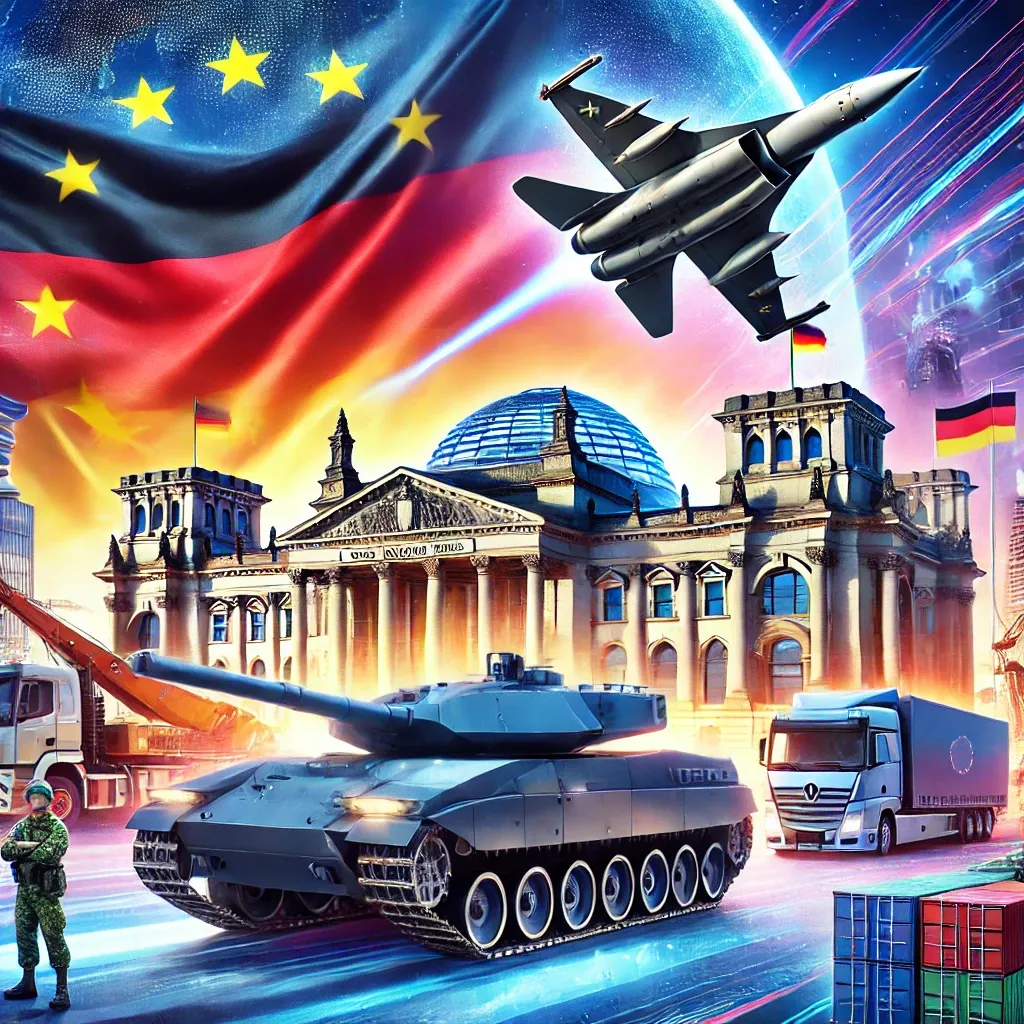
Vancouver, March 18, 2025 - On May 8, 2025, Germany will mark 80 years since the end of World War II, a historic moment that has long shaped its cautious approach to military policy. However, in a striking shift, Germany is now poised for a significant rearmament initiative. Incoming Chancellor Friedrich Merz is spearheading efforts to boost military spending in response to evolving European security concerns, proposing to ease the stringent "debt brake" regulations—potentially unlocking hundreds of billions of euros for defense.
The European Defense Strategy and Germany’s Role
This initiative comes as Europe faces escalating security threats, particularly after the U.S. government’s suspension of military aid to Ukraine amidst tensions with President Trump. European Commission President Ursula von der Leyen has reaffirmed the necessity of a stronger European defense strategy, introducing the "ReArm" plan, which could allocate €800 billion ($840 billion) to fortify the continent against the looming Russian threat.
Also, at a recent networking event, when a German representative was asked about rearming Europe and spending possibly 800 billion, the audience was told "As much as it takes, as long as it takes."
Doubling the German Defense Budget
Merz’s administration has suggested that Germany’s defense budget could double to 100 billion euros per year, an increase not seen since the country’s post-war reconstruction. If enacted, this rearmament would mark a fundamental break from Germany’s long-standing military restraint, signalling a historic pivot precisely 80 years after WWII’s conclusion. The proposed legislation requires rapid approval from the outgoing parliament, necessitating a two-thirds majority to amend constitutional debt limits.
Economic and Business Implications for Canada
Critics warn of the financial consequences of Germany’s ambitious military buildup, with media reports highlighting concerns about "gigantic debts." Analysts like Jacob Ross suggest that the economic and geopolitical impact of this move could reshape not only Germany’s fiscal policies but also the broader European balance of power. As EU nations deepen defense cooperation, Germany’s evolving stance raises pivotal questions about its future role in global security.
How Europe’s Rearmament Affects Canadian Businesses
The economic and business implications of Europe rearming for Canadians are complex and depend on several factors, including the scale of rearmament, Canada’s role in it, and the broader global economic context.
Potential Positive Impacts
- Increased Export Opportunities: Europe’s rearmament could boost demand for raw materials like steel, aluminum, and critical minerals, many of which Canada produces in abundance. If European nations ramp up military manufacturing, Canadian firms could secure contracts to supply these resources. The Canada-EU Comprehensive Economic and Trade Agreement (CETA), in place since 2017, has already increased bilateral trade by over 57% between 2016 and 2024, and this could further open doors for Canadian exporters, especially in aerospace (e.g., Bombardier) or engineering (e.g., SNC-Lavalin).
- Diversification from U.S. Reliance: With roughly 75-80% of Canada’s exports currently going to the U.S., closer economic ties with Europe could reduce this dependency. A rearmed Europe might seek deeper trade partnerships, offering Canadian businesses new markets and a buffer against U.S.-centric trade shocks, like the recent 25% tariffs imposed on Canadian goods in March 2025.
- Defense Sector Growth: Canadian defense companies, such as General Dynamics Land Systems-Canada or CAE, could benefit from NATO-related contracts or joint projects. Europe’s push to bolster its military might align with Canada’s NATO commitments, potentially leading to collaborative innovation and job creation in high-tech sectors.
- Energy Demand: If rearmament increases Europe’s energy needs, Canada’s energy sector—particularly natural gas and renewables—could see a surge in demand. Europe’s shift away from Russian energy since 2022 has already heightened interest in Canadian LNG, and this trend could accelerate.
Potential Negative Impacts
- Costly Participation: If Canada joins Europe’s rearmament efforts (e.g., through NATO spending increases), it could strain public finances. Canada’s federal debt has more than doubled in recent years, and additional defense spending might divert funds from domestic priorities like infrastructure or healthcare, potentially slowing economic growth.
- Trade Disruptions: Europe’s focus on rearmament could shift its economic priorities, reducing demand for non-military Canadian goods (e.g., agricultural products or consumer goods). If European nations prioritize defense budgets over other imports, Canadian businesses outside the defense supply chain might lose market share.
- U.S. Tensions: Deepening ties with Europe could complicate Canada’s relationship with the U.S., especially amid current trade frictions. The U.S. might view Canadian support for European rearmament—potentially at the expense of North American defense integration—as a slight, risking further tariffs or retaliatory measures that hit Canadian businesses hard.
- Inflation and Resource Strain: Increased global demand for materials like steel or rare earths could drive up prices, squeezing Canadian manufacturers that rely on these inputs. If rearmament fuels inflation in Europe, it might spill over to Canada, raising costs for businesses and consumers already grappling with post-tariff economic pressures.
Broader Context and Uncertainty
The outcome hinges on how Europe’s rearmament unfolds. A modest, targeted buildup might offer Canada niche opportunities without major downsides. However, a massive, trillion-euro effort—especially if funded by debt in already strained European economies—could destabilize global markets, indirectly harming Canada’s export-driven economy. The duration and scope of U.S. tariffs, Canada’s fiscal response, and the Canadian dollar’s reaction will also shape the net impact.
Conclusion
For Canadians, rearming Europe could be a mixed bag: a chance to diversify trade and boost certain sectors (like resources and defense), but with risks of higher costs, strained finances, and trade disruptions. Businesses tied to military supply chains or exports to Europe might see gains, while others could face headwinds. The balance depends on how Canada positions itself—whether as a strategic partner or a bystander—and how global economic ripples play out.
#Germany Defense #European Rearmament #Canada EU Trade #Chancellor Friedrich Merz #European Security #Global Economy #European Commission President Ursula von der Leyen #Defense Spending #Geopolitics 2025 #German Canadian Business News #Elke Porter
Connect with Elke at Westcoast German Media or on LinkedIn: Elke Porter or contact her on WhatsApp/Text: +1 604 828 8788
